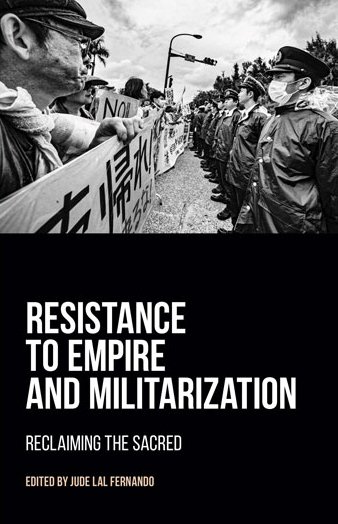Resistance to Empire and Militarization
Twenty-five leading scholars/practitioners set themselves the question of how to build a non-imperialist future and to give hope to people seeking justice, peace and freedom
 Resistance to Empire and Militarization - Reclaiming the Sacred
Resistance to Empire and Militarization - Reclaiming the Sacred
Fernando, Jude Lal (ed)
Equinox
ISBN: 9781800500204
Reviewed by Alec Gilmore
If the title puts you off, settle for the subtitle. From the end of the 18th century churches have always been sensitive to world affairs (poverty, development and the environment) but matters of Empire and Colonialism, Militarisation and Pacifism have often been by-passed or soft-pedalled, partly because nationalist claims that militarisation is for peace have too often been marred by those same nations, with their inherent thrust for expansion and control, constantly being at war or thwarting any peaceful negotiations to resolve conflicts while criminalising and destroying progressive social and political movements in the name of security.
Reclaiming the Sacred is a rare product. Three factors give it its edge. One, its contributors. Twenty-five leading scholars/practitioners (covering three generations of imperial invasions and genocidal massacres across the globe) set themselves the question of how to build a non-imperialist future and to give hope to people seeking justice, peace and freedom.
Two, their focus is Causes. Why war, poverty or inequality? Questions rarely asked. Solutions often sidestepped or suppressed.
Three, their resources. Neither ideology nor Reports (Governments, charities, world organisations or whatever) but listening to people, seen not as ‘victims‘ but ‘Bearers of Hope’ in search of an alternative world worth fighting for.
The subtitle sets the tone — ‘sacred’, not secular. Its vision is lofty. Its range wide. Its depths deep. Not all that easy to handle, prone to dissension and easy to dismiss until confronted by a few hard facts.
For example, the question ‘why is the world in the state it is?’ led them to identify the bridges that had to be crossed: mass killings, starvation, rape, militarised prostitution, torture, forced disappearances, land grab, displacement, and the destruction of nature. That then unearthed the fundamental causes of many conflicts in the non-Western (three-fourth) world, which were (and still are) imperialism and militarisation, both of which have to be overcome if we are to save humankind and nature, lead to peace and restore our divinity and humanity.
‘Testimonies of Liberation’, fully documented and encouraging, come from those who have already put their shoulder to the wheel, with a commitment to world-wide concerns for the Environment or reclaiming the sacredness of Lives, Lands and Seas, and go some way to balance the hard facts but the sting is in the tail. The root causes are still empire, militarisation and capitalism, with Britain, founded on militarisation and capital, the most expansive, top of the league for empire building, and maintained by psychological warfare and advanced technology. For these writers the driving force is that they have heard the cries and listened to the hopes of the suffering people.
Then, with ‘Testimonies of Liberation’ come ‘Rays of Hope’. After America’s ‘forgotten’ Korean war (1945-48) and years of US military presence in the region one such Ray is a chapter on ‘The Empathetic Power of Suffering: The Memories of Killing and Feminist Interfaith Spiritual Activism’, with an imaginary interfaith dialogue between a Christian feminist theologian and a female Zen Buddhist activist, showing how the feminist praxis of peacemaking can contribute to a politics of love counteracting war and militarism.
If Korea doesn’t grab you there is no shortage of other stories from Asia, Africa, Latin America, the Caribbean, Pacific Islands and beyond.
Clearly a call for prayer, and plenty to pray about, but only if we set about creating conditions in which the prayers can be answered.
Alec Gilmore is a Baptist minister
Baptist Times, 17/12/2020